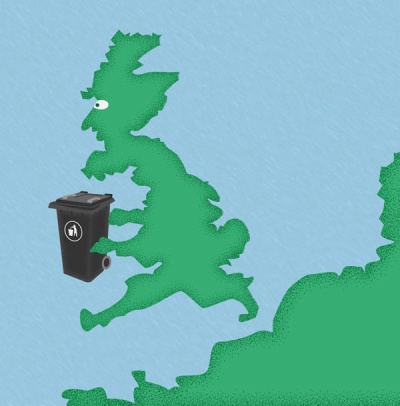Hard decisions: Brexit and the environment
Brexit may mean Brexit, but The Insider wonders what it means for waste policy

I write this on the eve of Trump’s inauguration. Our leader, Mrs May, has just delivered her speech setting out her opening Brexit gambit, essentially saying: “We’re prepared to leave wholesale, so don’t imagine we won’t walk away from an agreement that is inadequate. And by the way, you’ll be worse off if you don’t give us a good exit deal.” It feels like an uncertain world, and like we’re being cut off or we’re cutting ourselves adrift at a time when the world around us feels more unstable and threat-laden than it has for decades. Perhaps waste management seems, all of a sudden, to be a marginal issue – aren’t there bigger things to occupy our minds?
Well, probably, but that doesn’t mean it’s not important: important enough, in fact, to be one of the first sectors to be impacted by post-truth politics. After all, how many newspaper stories have there been over the past 15 years in which journalists, having cut themselves loose from any bond to the truth, have sought to undermine the efforts of local authorities and service providers by latching on to the ‘misery’ avowedly experienced by one or two families, as though the number ‘two’ would always be considered sufficient to represent the experiences of 27 million or so households? Indeed, waste management appears to have been a test bed for post-truth politics.
But back to the nuts and bolts: in principle, we’re going to leave the EU, but what does that mean for waste management here in the UK? Well, for a start, the exchange rate movement since the EU referendum has made anything whose price is denominated in currencies other than sterling more expensive. This includes, for example, any equipment imported from other countries (a fair amount of waste management technology is imported) and gate fees for the treatment of refuse-derived fuel in other countries.
At the same time, and for similar reasons, material values ought to be higher in sterling terms than they would otherwise have been, so there should be some good news (in relative terms) for recyclers from the fall in value of the pound. UK manufacturers of waste management equipment will have become more competitive relative to overseas suppliers, both here and in other markets. In general, as one would expect, imports are more expensive, and exports/sales of materials denominated in other currencies have benefitted.
 This article was taken from Issue 87
This article was taken from Issue 87But in policy terms, what might change? In Wales and Scotland, probably not much. But in England, the question of whether or not we adopt the Circular Economy Package (CEP) is of major significance. “Surely,” you will say, “we’re not going to do that?” Mrs May has said we’re not just going for different beds in the same house: we’re moving out, so the house rules no longer apply. Well, they could still apply. The government has indicated it will implement the ‘leave’ vote along with a ‘Great Repeal Bill’. This will repeal the European Communities Act 1972, and will remove UK legislation’s references to EU law in the process of effectively moving all EU-linked legislation into UK law. The repeal bill will only take effect once the Brexit process reaches its conclusion, which is likely to be in 2019. If the CEP becomes EU law before the UK officially departs, as a result of the bill, the UK may have already adopted the package’s targets.
What happens after that is, like a lot of other things, anyone’s guess, and nothing should be taken for granted. Exiting the EU means that the politics around environmental matters – on the domestic political scene – needs to be elevated far above its current status. The fact that the EU has significantly driven so much environmental policy in the UK has tended to diminish the position of ‘the environment’ in domestic political discourse: in a hard Brexit, though, all of that changes. We need, therefore, to ensure we’re (re-)making the case for a forward- thinking waste management strategy for all the UK. 










